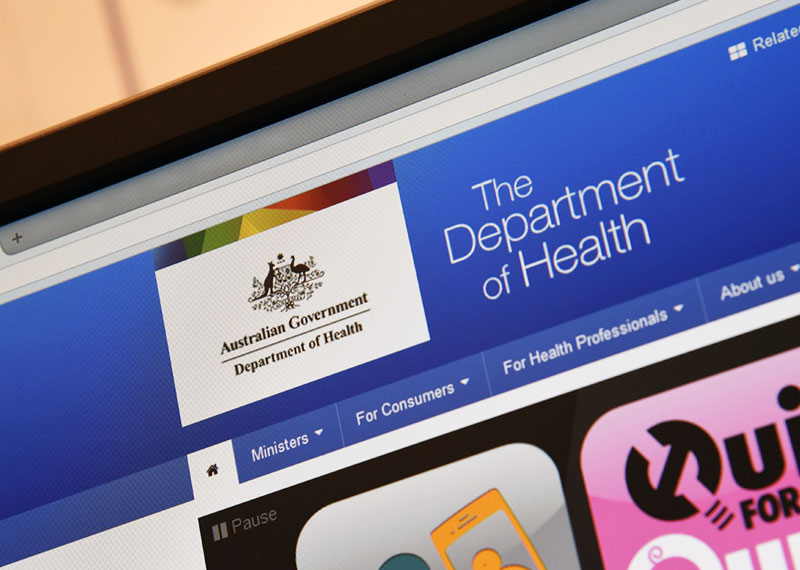Browse our range of reports and publications including performance and financial statement audit reports, assurance review reports, information reports and annual reports.
The Auditor-General responded on 21 August 2020 to correspondence from the Hon Mark Butler MP dated 26 July 2020, requesting that the Auditor-General review the integrity of the Supporting Reliable Energy Infrastructure Program, in particular with reference to the grant to Shine Energy. The Auditor-General provided a follow-up response on 16 September 2020.
Please direct enquiries relating to requests through our contact page.
Australian Industry Involvement Program. Department of Defence The audit examined the management by Defence of its Australian Industry Involvement (AII) Program. AII is the major program through which Defence gives effect to government policy on Australian industry. The objective of the audit was to assess the extent to which the AII Program has achieved its two policy objectives, which are to :
- develop and sustain strategically important capabilities in Australian industry to support Australian Defence Force operations and Defence capability development; and
- maximise Australian industry involvement in Defence's procurement of goods and services, consistent with the government procurement policy objective of achieving best value for money to the Commonwealth.
The IIF program is designed to redress the low level of provision in Australia of high risk venture capital for small new technology - based companies commercialising research and development. The objective of the audit was to determine whether the IIF program was being effectively managed by the Industry Research and Development (IR&D) Board and the Department of Industry, Tourism and Resources to achieve the program objectives. The audit focused on corporate governance arrangements for program administration, the selection process to award licences, the safeguards to protect the Commonwealth's financial interests, management of licence agreements, and program performance management. The audit also examined program results to date from available data.
The Auditor-General responded on 20 December 2024 to correspondence from the Hon Dr Anne Aly MP dated 26 November 2024, requesting that the Auditor-General conduct an investigation to examine the administrative arrangements of the Inclusion Support Program (ISP).
Please direct enquiries through our contact page.
The Australian Political Parties for Democracy Programme is administered by Finance. The programme aims to strengthen democracy internationally by providing support for the international activities of Australia's major political parties. Funding of up to $1 million is provided annually under the programme to each of the Australian Labor Party and to the Liberal Party of Australia. Guidelines for the programme provide for the parties to re-apply for funding each year and set out the criteria against which applications for funding are assessed. The proposed audit would examine the administration of the program by Finance, including the adequacy of assessment of acquittal documentation and requests to roll over funding.
The ANAO concluded that DHAC's administration of the National Cervical Screening Program is generally sound. The ANAO found that the department has a key role in the Program by providing secretariat services and other support to the NAC, which provides policy advice to AHMAC, and by supporting initiatives to further develop the Program. Some areas of DHAC's administration of the Program provide examples of good practice. Related examples are the early identification of the need to monitor the Program, the early identification of possible data sources for monitoring, and the use of an independent body to provide advice, through the Australian Institute of Health and Welfare, on performance indicators and data sources. A further example is DHAC's administration of the provision of cervical screening funding assistance to the States and Territories through Public Health Outcome Funding Agreements, which complies with the principles for sound Specific Purpose Payments program administration advocated by the Joint Committee of Public Accounts and Audit in their Report 362. On the other hand, the ANAO has identified areas for improvement in quality assurance for the analysis of Pap smears by pathology laboratories.
The Auditor-General responded on 12 May 2020 to correspondence from Ms Zali Steggall OAM, MP dated 23 April 2020, requesting that the Auditor-General consider an audit of the Australian Government’s Underwriting New Generation Investment (UNGI) program. The Auditor-General provided a follow-up response to Ms Steggall OAM, MP on 24 July 2020.
Please direct enquiries relating to requests through our contact page.
The objectives of the audit were to:
- assess the extent to which major program objectives were achieved;
- identify major strengths and weaknesses related to the economy, effectiveness and efficiency of the program administration; and
- identify areas of improvements and risks which should be addressed in arrangements with a private sector project manager.
Audit criteria were developed to address the areas of program planning and implementation, performance measurement and monitoring, responsiveness to emerging issues, dispute resolution mechanisms, risk management and program improvement measures.
The objective of the audit was to assess the effectiveness of Indigenous Business Australia’s management and implementation of the Indigenous Home Ownership Program.
Please direct enquiries relating to reports through our contact page.
The objective of the audit was to assess the effectiveness of the Department of Human Services' management of Medicare compliance audits.
Please direct enquiries relating to reports through our contact page.
Audit Practice: Auditing Regulatory Activities is intended for senior management and those responsible for managing internal audit within Australian Government entities that have a regulatory function.
Please direct enquiries through our contact page.
The Auditor-General responded on 11 December 2020 to correspondence from the Hon Richard Marles MP dated 16 November 2020, requesting that the Auditor-General conduct an investigation to examine the Future Submarine and Future Frigate programs.
The Auditor-General provided a follow-up response to Mr Marles on 19 March 2021.
Please direct enquiries relating to requests through our contact page.
The Auditor-General has responded on 3 July 2020 to correspondence from the Hon Brendan O'Connor MP dated 11 June 2020, requesting that the Auditor-General consider an audit of the operation of the Small and Medium Enterprises (SME) Export Hubs program. The SME Export Hubs program is administered by the Department of Industry, Science, Energy and Resources.
Please direct enquiries relating to requests for audit through our contact page.
The audit objective was to assess the effectiveness of the (former) Department of Industry’s administration of the Australian Apprenticeships Incentives Program.
Please direct enquiries relating to reports through our contact page.
Given the importance of customer feedback to Centrelink's business, the ANAO considered it timely to conduct a series of performance audits relating to Centrelink's customer feedback systems, particularly in relation to its delivery of the services then provided on behalf of FaCS. The overarching objective of this series of ANAO performance audits of Centrelink's customer feedback systems was to assess whether Centrelink has effective processes and systems for gathering, measuring, reporting and responding effectively to customer feedback, including in relation to customer satisfaction with Centrelink services and processes.
The objective of the audit was to assess the effectiveness of Defence’s monitoring of the implementation of ANAO and internal audit recommendations. The audit also examined a sample of ANAO and internal audit recommendations—reported as being complete by Defence—to assess the extent to which these recommendations had been implemented by Defence.
The audit objective was to assess the effectiveness of the Department of Health’s administration of the Medical Specialist Training Program.
Please direct enquiries relating to reports through our contact page.
The audit reviewed the sale of Works Australia, a business unit of the Department of Administrative Services, which provided project, architectural and engineering design and documentation services to the Commonwealth and State Governments and private enterprise. The objectives of the audit were to review the efficiency and effectiveness of the management of the sale.
ANAO found that the actions taken by the Department during the course of the audit to update and improve the Notes on Administration and administrative processes, by commissioning various specialist studies and reviewing governance issues, has established a sound basis for ongoing effective management of the National Highway System. The Department advised ANAO that changes to the Notes on Administration reflect joint work done with the ANAO to identify where improvements could be made and incorporate not only suggestions and recommendations that the ANAO has made in the final report but also during the audit. ANAO considers that the comprehensive revision of the Notes on Administration undertaken by the Department should foster marked improvements in the management of the National Highway System.
The audit objective was to assess the effectiveness of the Department of Industry's administration of the Commercialisation Australia Program.
Please direct enquiries relating to reports through our contact page.
The Auditor-General responded on 16 June 2021 to correspondence from Senator Malcolm Roberts dated 19 May 2021, requesting that the Auditor-General conduct an investigation to examine the administration of Natural Disaster Relief and Recovery Arrangements programs and funding.
Please direct enquiries relating to requests through our contact page.
The audit covered major program elements within the Department of Primary Industries and Energy and Environment Australia that are managed:
- directly by DPIE or Environment Australia;
- through the One-Stop-Shop project assessment process administered by the States/Territories; or
- by non-government organisations.
The purpose of the audit was to examine and benchmark the administrative processes established for these programs. The primary focus of the audit was to draw on the best elements of past practice (particularly in relation to programs involving the One-Stop-Shop) and highlight any shortcomings so that the risks to program effectiveness and accountability could be addressed in the implementation of the Natural Heritage Trust.
The Auditor-General responded on Thursday 27 February 2020 to correspondence from Senator Sarah Hanson-Young dated 16 February 2020, requesting that the Auditor-General conduct an investigation to examine the eligibility guidelines and administration of grant funding arrangements set out under both the Environment Restoration Fund and Communities Environment Program, and the conduct of any relevant parties in relation to these grant funds. The Auditor-General provided a follow-up response to Senator Hanson-Young on 24 July 2020.
Please direct enquiries relating to requests through our contact page.
The audit objective was to assess the effectiveness and equity of the award of funding under the Clean Technology Program in the context of the program objectives and the Commonwealth’s grants administration framework.
Please direct enquiries relating to reports through our contact page.
The Department of Immigration and Multicultural Affairs (DIMA), administers the Commonwealth's settlement programs, which seek to assist migrants and refugees to participate in Australian society. Provision of English language training to newly arrived migrants and refugees has been a long standing and significant part of this settlement support, with some 1.5 million new arrivals assisted in this way since 1948. The objective of the audit was to examine DIMA's management of the Adult Migrant English Program Contracts, focusing on performance outcomes; strategic contract management and coordination; program expenditure, with emphasis on contract funding arrangements; and whether contract monitoring and performance information adequately support effective program management. The ANAO made six audit recommendations aimed at improving program performance management and reporting; strategic management and coordination; management of financial risks; and monitoring of contractor performance, which were all accepted by DIMA.
The objective of the audit was to assess the effectiveness of the Department of the Environment’s administration of the Biodiversity Fund program.
Please direct enquiries relating to reports through our contact page.
The Auditor-General responded on 14 January 2020 to correspondence from the Hon Catherine King MP, requesting that the Auditor-General conduct an investigation to examine programs supporting regional development and jobs growth. The Auditor-General also responded on 2 April 2020 to follow-up correspondence from the Hon Catherine King MP dated 3 March 2020, alerting the Auditor-General to evidence given in Senate estimates that relates to the original correspondence. The Auditor-General provided a follow-up response to the Hon Catherine King MP on 24 July 2020.
Please direct enquiries relating to requests through our contact page.
The audit objective was to assess the effectiveness of the Department of Health’s monitoring and implementation of both ANAO performance audit and internal audit recommendations.
Please direct enquiries relating to reports through our contact page.
The audit reviewed the extent to which the Department of Health and Ageing (Health) had implemented the recommendations of Audit Report No. 13 of 1998-1999, Aboriginal and Torres Strait Islander Health Program, taking account of any changed circumstances or new administrative issues identified as impacting the implementation of these recommendations.
The audit objective was to assess the Department of Defence’s progress in delivering Multi-Role Helicopters (MRH90 aircraft) to the ADF through AIR 9000 Phases 2, 4 and 6, within approved cost, schedule and performance parameters.
Please direct enquiries relating to reports through our contact page.






